
Ministers of the Federal Supreme Court (STF) assess that the package of measures that restrict the Court’s powers is unconstitutional and could be overturned if it eventually reaches the Court. The texts advanced in the Chamber of Deputies this Wednesday (9).
The Chamber’s Constitution and Justice Committee that allows Congress to suspend STF decisions and expands the .
The ministers state, in private conversations, that the Constitution requires that suggestions for reformulating the rules of the Judiciary be presented by the court itself and sent to Congress. The original defect, as it is called, would prevent changes in the activities of magistrates from being proposed by deputies and senators.
The reading made by the ministers is that it represents retaliation against the STF after a lack of transparency and traceability.
The proposal considered most serious by the ministers is the one that allows the suspension of magistrates’ decisions. The perception is that the initiative comes up against an immutable clause – that of the separation of Powers. Therefore, in the event of judicialization, it would possibly not pass the Court’s scrutiny.
Both the president of the STF, minister Luís Roberto Barroso, and the dean, minister Gilmar Mendes, have already publicly stated that the review of the Court’s decisions is not compatible with democracy.
In November last year, Barroso said at an event at Mackenzie Presbyterian University, in São Paulo, that the proposal was “unacceptable” and referred to the “dictatorial Constitution of 1937”, from the Vargas Era.
Gilmar has also stated that the PEC “does not make sense, as it breaks the idea of the division of Powers”, and asked for “great care”. “It does not pass any test of a model of constitutional rule of law”, he stated.
Barroso has argued that the National Congress is the appropriate arena for this type of discussion, but he would like the Judiciary to be consulted to contribute to the debate.
The president’s aides say that the minister is concerned about “messing with a team that is winning” – a reference to the role that the Court has played over recent years in defending democracy.
The Constitution and Justice Commission, which gave the go-ahead for the proposals to move forward this Wednesday, assesses the constitutionality and admissibility of the proposals, not their merit. It is only up to the collegiate to give approval or not for the advancement of texts in the Chamber.
Once approved, the proposals need to be analyzed by a specific committee, which must still be created and installed. If it passes in the Chamber without changes in the special committee and in the plenary, the text could go to promulgation.

